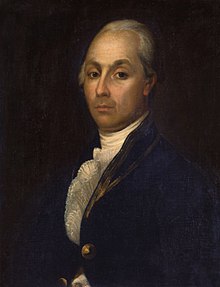Alexander Radishchev
| Alexander Radishchev | |
|---|---|

Earlier than 1790. By unknown author
|
|
| Born |
August 31, 1749 Moscow, Russian Empire |
| Died | September 24, 1802 (aged 53) Saint Petersburg, Russian Empire |
| Occupation | Writer |
Alexander Nikolayevich Radishchev (Russian: Алекса́ндр Никола́евич Ради́щев; 31 August [O.S. 20 August] 1749 – 24 September [O.S. 12 September] 1802) was a Russian author and social critic who was arrested and exiled under Catherine the Great. He brought the tradition of radicalism in Russian literature to prominence with the publication in 1790 of his Journey from St. Petersburg to Moscow. His depiction of socio-economic conditions in Russia earned him exile to Siberia until 1797.
Radishchev was born into a minor noble family on an estate just outside Moscow. His father, Nicholas Afanasevich Radischev, a prominent landowner in Moscow, had a reputation for treating his 3000-plus serfs humanely. Until he was 8 years old he lived on his father's estate in Verkhni Oblyazovo (then part of the Saratov Governorate, today in Penza Oblast), one hundred miles west of the Volga river with a nurse and tutor. He then went to live with a relative in Moscow, where he was allowed to spend time at the newly established Moscow University. In 1765 his family connections provided him with an opportunity to serve as a page in Catherine's court, which he nonetheless regarded with suspicion for its "contempt for the Orthodox faith, and a desire to deliver the homeland into foreign (German) hands". Because of his exceptional academic promise, Radishchev was chosen as of one of a dozen young students to be sent abroad to acquire Western learning. For several years he studied at the University of Leipzig. His foreign education influenced his approach to Russian society, and upon his return he hoped to incorporate Enlightenment philosophies such as natural law and the social contract into Russian conditions. Even as he served as a Titular Councillor, drafting legal protocols, in Catherine's civil service, he lauded revolutionaries like George Washington, praised the early stages of the French Revolution, and found himself enamored of the Russian Freemason, Nicholas Ivanovich Novikov, whose publication The Drone offered the first public critiques of the government, particularly with regards to serfdom. Novikov's sharp satire and indignation inspired Radischev's most famous work – Journey from St. Petersburg to Moscow – in which he emulates Novikov's harsh and passionate style. He too was especially critical of serfdom and of the limits to personal freedom imposed by the autocracy.
...
Wikipedia
